By John Pickard
The state of Israel is facing the greatest peace-time crisis in its 75-year history. In reality, it is an ‘omni-crisis’, with several overlapping dimensions, but the key issues are the refusal of the Palestinian population to accept a new apartheid, and the intensification of internal divisions within Israel itself.
Although Israel is a regional super-power, moreover one with a nuclear arsenal, the crisis today is not amenable to a military solution. We should also add, that although the springboard of these multiple crises lie within the political movements in Israel, the dire situations facing both Palestinians and Israelis have been enabled and facilitated by the international ‘friends’ of Israel, who have been completely uncritical of Israeli policies for decades.
The occupied West Bank has a population of around five million Palestinians, but the great majority of the land area has been confiscated for exclusively Jewish settlements and for Israeli military use. Palestinians now control only around ten per cent of the land area outside of the 1967 borders of Israel, and even this area is subject to regular Israeli military incursions.
The so-called ‘Palestinian Authority’ is little more than a glorified municipal government for the larger cities, where most Palestinians live. It is a corrupt and undemocratic quasi-government, providing a good income only to the well-connected friends and families of the Fatah leadership, and despite its occasional ‘radical’ rhetoric, it is beholden to the Israeli state for such control as it can wield over the Palestinian population.
The West Bank economy, such as it is, has been strangled by Israeli control, with permission denied for the sinking of wells or irrigation for agriculture or even for the construction of housing. Meanwhile, Israel has poured billions into constructing modern housing developments in settlements across the whole of the West Bank, populated by well over half a million exclusively Jewish settlers. New roads have been built that are for the exclusive use of Jewish settlers. Any Jewish person living in London or New York has more rights in the West Bank, in terms of civil and economic power than a Palestinian living there.
Daily harassment, humiliation and brutality…and now pogroms
The daily life of a Palestinian is one of regular harassment, humiliation and casual brutality meted out by Israeli soldiers, at the hundreds of check-points across the West Bank, or in military incursions into Arab towns and villages.
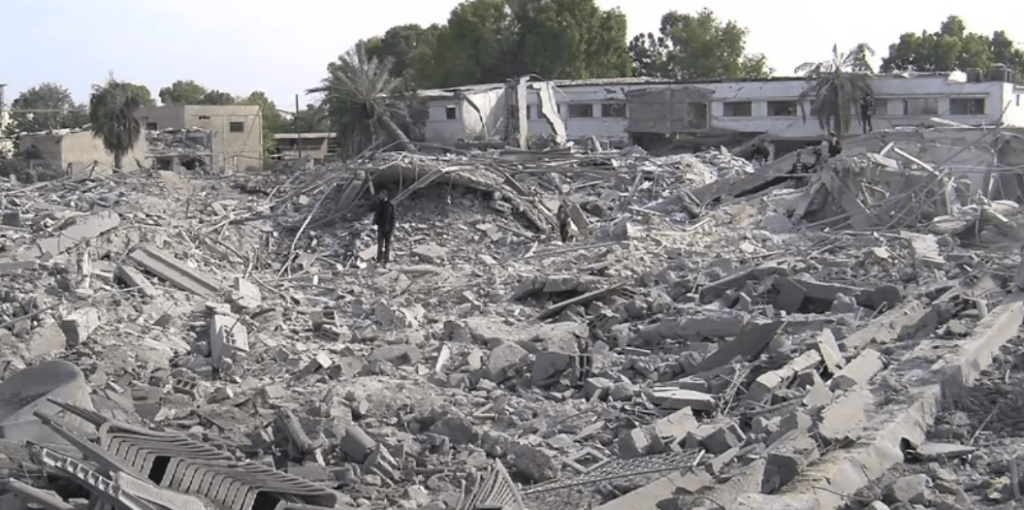
It is no better in Gaza, where over two million Palestinians suffer the double burden of the repressive dictatorship of Hamas and economic strangulation from an Israeli blockade. Nothing goes in or out of Gaza except by the good grace of the Israeli government. That applies to electricity, water and cash for ATMs, not to mention food and economic materials.
The economy of Gaza is utterly broken and even the sea off the beaches is restricted by the Israeli navy. The desperation of Palestinians on the West Bank is more than matched by the utter hopelessness of Gazans and the only response that Hamas has, is to blindly lob missiles into Israel – giving the IDF a pretext for raining down death and destruction on the civilian population.
It is hardly surprising, therefore, that there is a seething anger among Palestinians, especially among youth. On the West Bank, it is anger towards the pliant and corrupt Palestinian Authority, but above all against the occupying authority, Israel, and the settlers themselves. There is no lead being given by a Palestinian labour movement and decades of being misled by Fatah have left the population without a strategy or a direction. In the febrile atmosphere of the West Bank, young people occasionally turn to isolated acts of violence or even the murder of individuals or groups of settlers.
Retaliation has always been swift and brutal. After two settlers were murdered a few of weeks ago, Jewish settlers descended on the Arab town of Huwara, where the murderers were believed to have originated. They burnt scores of cars and torched dozens of houses. Several Palestinians were killed, and dozens were beaten.
It is profoundly ironic, given the history of the Jewish people in the last few centuries, that Israeli politicians have referred to the Jewish settlers’ attack on Arabs as a pogrom. Nor was it an isolated incident, because harassment, vandalism and attacks on Arab villages by Jewish settlers has become a regular feature in the occupied West Bank. Whereas attacks on settlers are referred to in the Israeli press (and western media) as “terrorism” the violence meted out by settlers and the Israeli army is not. [See report of settler attacks Arab villagers, on the website of B’Tselem, here].
2022: Israeli army killed 146 West Bank Palestinians
A generalised and no doubt violent reaction from the mass of Palestinian youth is only a matter of time. Within the Israeli political establishment, the talk is not ‘if’ there will be a new uprising, a new intifada, but when it will happen.
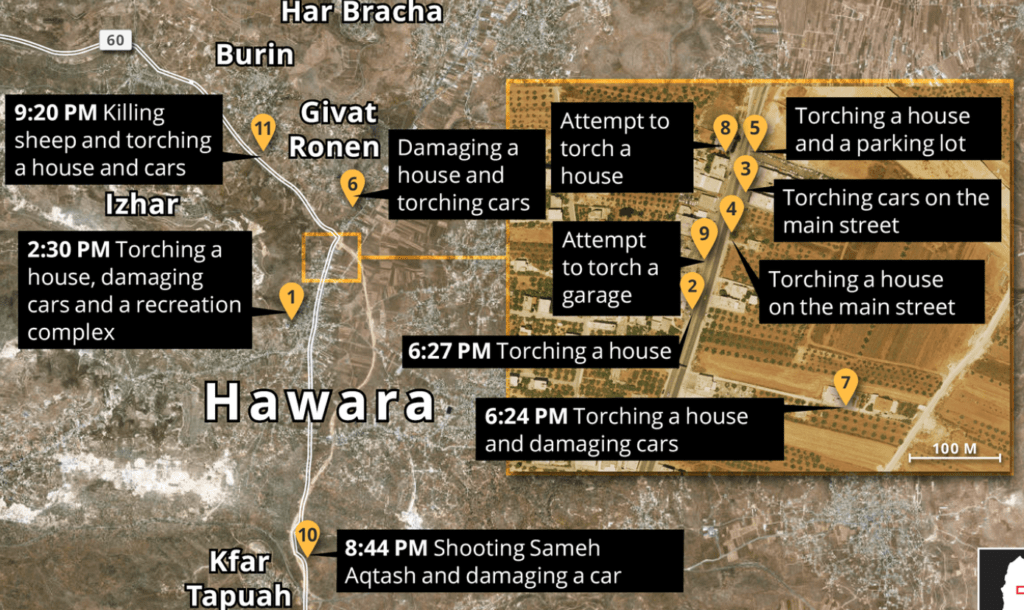
The newspaper columnist, Gideon Levy, writing in the Israeli newspaper Haaretz (January 29), scathingly condemned the Israeli IDF and its brutal approach to repression in the West Bank, blaming it for the upsurge in violence against settlers. “What were you thinking?”, he asked, “That the killing of 146 Palestinians in the West Bank in 2022, according to B’Tselem, most of them non-combatants, would be meekly accepted? That the killing of about 30 people in the month to date would pass quietly?”
When the powder-keg does explode, it will be the responsibility of the Israeli government and all of those states and politicians that have supported its apartheid policies over the years.
But as if this were not enough of a crisis in its own right, ‘internal’ Israeli government policies have also pushed Israel to the brink. The election of the most right-wing government in Israel’s history at the end of last year means that there are out-and-out anti-Arab racists and neo-fascists in government ministries, including key posts like ‘security’, in charge of police. Some of these ministers openly goaded settlers to take ‘vengeance’ against the village of Huwara, for example.
The new government is systematically upgrading the role of religion, not only in education, but also in everyday life and it is challenging established rights and liberties. One of the parties in the coalition is avowedly against LBGTQ+ rights.
In due course, the government will seek to provoke Muslim opinion by opening up the ‘Temple Mount’ to Jewish worshippers and it has said that it will move towards some form of annexation of the West Bank.
A part of this new government’s strategy involves changes to the law, the main purpose of which is to stymie opposition movements and, not least, to get Prime Minister Netanyahu off corruption charges that he has had hanging over him for years. The minister for National Security in the new coalition is MK Ben Gvir of the Jewish Power Party. As the Association for Civil Rights in Israel points out, he has introduced changes to the Police Ordinance, giving himself “extensive and unprecedented powers enabling him to set priorities and determine policies for the police. This includes the ability to intervene in policies pertaining to investigations and handling of protests”.
For Netanyahu, the judiciary is too independent of government
The most controversial of the government’s proposals, however, has been for an overhaul of the judiciary, which they claim is dominated by the ‘left’ – which means that it sometimes offers a modicum of natural justice to the opposition and to Arabs in court. Netanyahu has decided that the judiciary would no longer have the powers to ‘strike down’ laws or be ‘independent’; appointments would be subject to government oversight. For hundreds of thousands of Israelis, this has been a final straw and waves of opposition to this measure have developed over recent weeks.
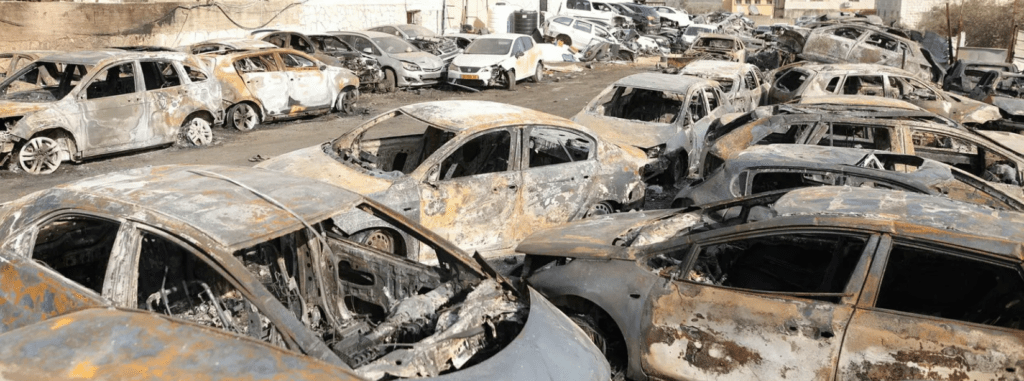
Every weekend for months there have been demonstrations in Israeli cities, the largest with as many as 200,000 in Tel Aviv, on a day when half a million demonstrated altogether. Haaretz called these the “largest demonstrations in the country’s history”. In population terms, that is equivalent in the UK to a million marching in protest in London and a further two million in other cities. The police chief of Tel Aviv himself took part in one rally, in uniform.
The protests also included demonstrations by military reservists, and this in a highly militarized state with compulsory national service for all Jews, followed by considerable obligations in the military reserve. Reservists have been blocking main roads (top picture) and government buildings in Jerusalem and tens of thousands have refused to attend training.
This week the protests culminated in a general strike. As banks, shops and businesses in Israel began to close, as the main airport, Ben Gurion, shut down, and as Israeli diplomats around the world refused to work, the government finally caved in. It has suspended – for now – its proposals for judicial reform.
But this is only a temporary respite. “When there’s an option to avoid civil war through dialogue,” Netanyahu said, “I take time off for dialogue.” It remains to be seen how long his “time off” will be, and there can be no doubt he will be back. “In a sign that he is not fully backing down,” the Financial Times explained (March 27) “he hit out at what he called ‘an extremist minority’ involved in the protests”.
Crises will merge into one in the months and years to come
In the meantime, as a sop to his right-wing cabinet colleagues, and to compensate for postponing the change in law on the judiciary, a new ‘civil guard’ will be created under the auspices of the anti-Arab racist ‘security’ minister, Ben Gvir. History has shown us that everywhere that fascist movement have been able to form semi-official ‘militias’ they become politically-based armed vigilante groups.
In Israel, Gvir’s aim would be to use it against the Arab minority. He would also aim to use it in support of the activities and pogroms of armed settlers and, not least, where it becomes necessary, against Israel’s very small but vociferous Jewish left. This will be Gvir’s aim, but it is also possible that it will lead to clashes between the new ‘militia’ and the regular police and state forces.
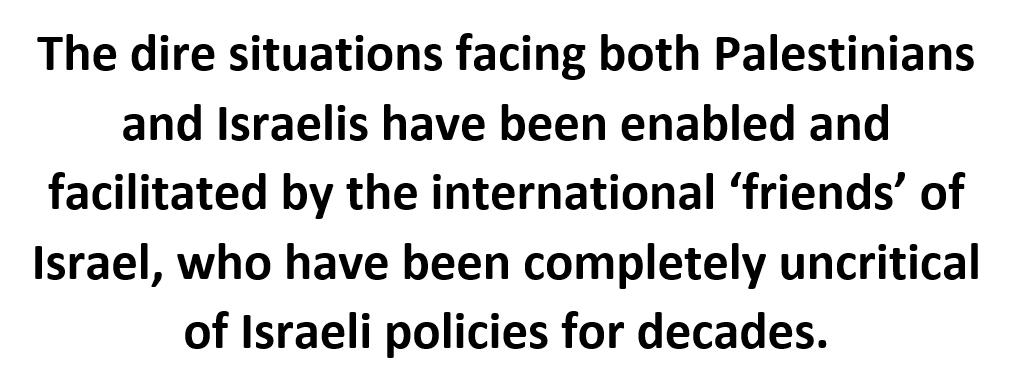
It is impossible to say where this chaotic crisis will end. From a socialist perspective, it would be possible for the social and national rights of the Palestinians to be provided for, without it being at the expense of most Israelis – those who live in Israel proper. The settlements, on confiscated land, are a different question.
It is possible for Israelis to achieve the ‘safe and secure homeland’ that has been an historic goal, without it being at the expense of Palestinian rights. But that is only from a socialist perspective, on the basis of a movement uniting the common interests of Jewish and Arab workers and a revolutionary restructuring of society. How that would unfold, and whether it would lead to two states or one, it is impossible to say in advance, and not for outsiders to decide. But, in any case, such a movement is unfortunately not on the horizon at the present time.
The two profound crises facing Israel/Palestine today are for the moment separate. The composition of the Israeli judiciary makes little fundamental difference to the daily oppression faced by Palestinians under occupation. Likewise in Israel, the mass opposition to Netanyahu’s politicisation of the judiciary has no overt connection to Palestine: there are no demands within that movement that are linked to Palestinian rights.
But as time goes by, and each of these separate crises intensifies, they will inevitably merge into one, and Israeli will face a political, social, economic and ethnic storm of unprecedented proportions. It is because they can see the coming tempest that internationally, so many politicians – those who have support Israel unstintingly – are full of foreboding for the future.
Thus Labour MP Margaret Hodge, a leading light in the Labour Friends of Israel, writes an opinion piece in the Guardian, not bemoaning the nearly two hundred Palestinians killed by the Israeli army in the last eighteen months, but the “heightened violence”.
Grim scenario unfolding – and the ‘friends’ of Israel bear some responsibility.
We have to be clear that the long-term advocates for Israel have effectively been apologists for apartheid policies, for repression on the West Bank and for the bombing of Gaza. They all bear a heavy responsibility for the grim scenario unfolding. They have constantly peddled a false “equivalence” between, on the one side, a brutal Israeli military occupation, and on the other, the blind and unorganized attempts by Palestinian youth to hit back. The one has always been ‘security’ while the other has been ‘terrorism’.
Socialists do not condone blind acts of violence directed at Israelis or Jewish settlers – they are wrong in themselves and as a ‘political’ strategy it is a dead end – but we completely understand the frustration, anger and feelings of impotence that lead to them. Calling for “peace”, “de-escalation” and so on from “both sides” is simply singing from the song book of the oppressors and is an insult to those facing daily humilities, brutality, economic deprivation and oppression.
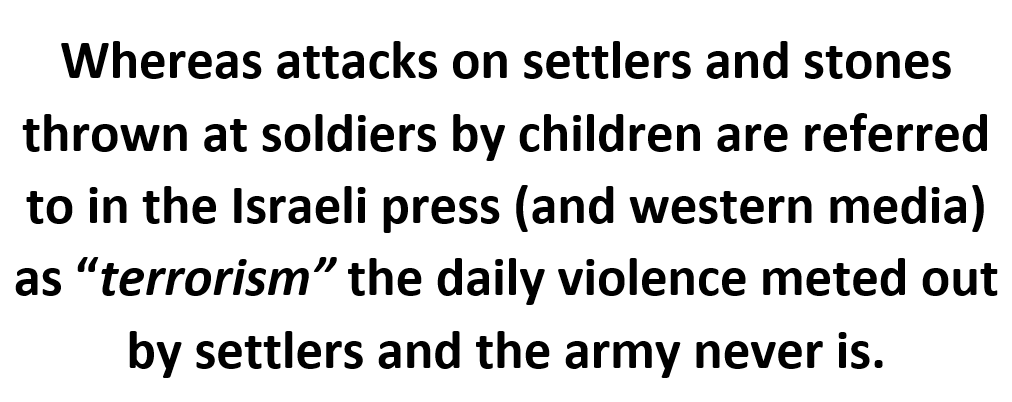
For decades now, the political allies of Israel have stood by and said nothing as Israeli politics has shifted further right. The ‘Labour Friends of Israeli’ may just as well have been renamed the ‘Labour Friends of Netanyahu’ over the last two decades. In Israel, politicians, newspaper columnists and even retired generals openly decry what they call a slide towards “apartheid”, where a government presides over a population divided on ethnic/national lines with political, civil and economic rights granted only to half. But dare to use that word in the Labour Party and you court expulsion.
In fact this most right-wing ever Israeli government is the logical outcome of all the policy shifts of previous years. It is following a trajectory long established by the Israeli state; it has simply discarded its fig-leaf. If the international friends of Israel are now uneasy about the extreme policies of Netanyahu’s new coalition, it is the discomfort of felt a Frankenstein faced with his own monstrous creation. They fear that support may be withdrawn from such an oppressive, authoritarian state – particularly in liberal and ‘left’ circles.
It may be the international labour movement, including that of the large Arab working class in Egypt and the wider Middle East that is in the end decisive in affecting events in Israel/Palestine. Socialists need to stand firm in favour of Palestinian national rights and social rights, and they will be won together or not at all.
The historic position of the Palestinian movement – at least the PLO – was until the late 1970s, for a “unitary, secular, democratic, Palestinian state”, which would encompass all the territory now occupied by Israel, plus Gaza. In recent decades, the Palestinian leadership – backed in words only by Western politicians – has called for a “two-state” solution. Now, to all intents and purposes, that looks dead in the water. Israel controls almost the entire territory of what would be “two states”, and shows little intention of ever giving up territory, except for tiny enclaves here and there and that is no ‘solution’ at all.
The depth of the political and national crisis in Israel cannot be over-stated. There can be no resolution of the national conflict between Israelis and Palestinians, between Jews and Arabs, on the basis of an apartheid state ruling indefinitely over an unwilling and oppressed nation. That road leads to disaster.
The ruling classes of the authoritarian Arab regimes, equally, offer no way forward, and they are queuing up to make deals with the US and Israel, for the exploitation of natural gas off the coast, for example, over the heads of the Palestinians. They cannot be trusted to intervene on behalf of Palestinian workers or farmers.
Solidarity with Palestinian resistance is the first duty of socialists, of course, but ultimately there can be no future for Palestinians or Israeli workers on the basis of capitalism. Only by linking the fight against national oppression with the fight against capitalism and imperialism as a whole, can there be a future for the workers of the middle east.



